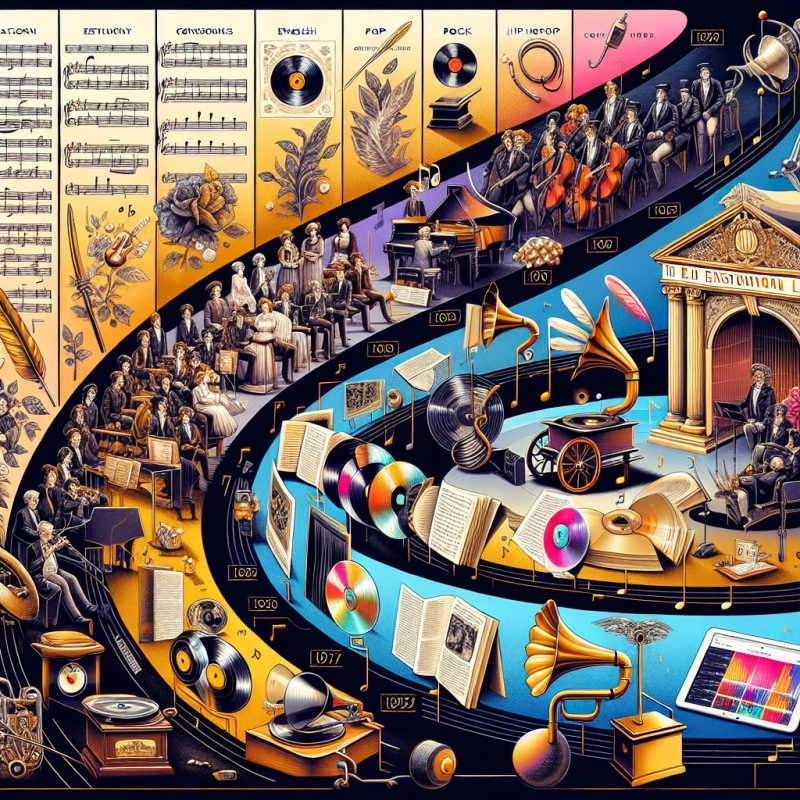From the captivating tale of The Beatles’ monumental rise, which not only reshaped the landscape of music but also marked the English language’s profound influence on the global music scene, the journey of English in the realm of melodies and harmonies is nothing short of inspirational. This exploration delves into the roots of English’s initial embrace by the music industry, its ascendancy to the pinnacle of global pop music, and its role in bridging cultures through lyrical fusion in non-English speaking territories. In the digital era, streaming platforms and social media have further catapulted English music to unprecedented heights, making it a pivotal tool for language learning and cultural exchange. As we look towards the future, the evolving presence of English in music continues to foster global connections, highlighting its enduring impact and the endless possibilities it heralds for artists and audiences alike. Engaging with this narrative offers practical insights into the dynamic interplay between language and music, all while maintaining a light and approachable tone that invites readers to explore the harmonious blend of English and music through a professional lens.
Tracing the Roots: English Language’s Initial Foray into Music
The inception of the English language in music can be traced back to the medieval period, marking a significant departure from the previously dominant Latin and vernacular tongues. This transition was not merely linguistic but also cultural, reflecting a broader shift in societal norms and values. The use of English in liturgical settings, notably in the works of composers such as John Dunstable, signalled a newfound appreciation for the language’s lyrical qualities and its capacity to convey complex emotions and narratives. This period laid the foundational stones for the
proliferation of English in musical compositions, setting the stage for its eventual dominance in various music genres worldwide. The undefined boundaries between languages in music during this era underscored the fluid nature of musical evolution, highlighting the adaptability and enduring influence of the English language in shaping musical traditions.
The Beatles and the British Invasion: A Turning Point for English in Global Music
With the emergence of
The Beatles and the British Invasion in the 1960s, the global music scene witnessed a seismic shift in the influence and prevalence of the English language. This era not only marked a significant expansion of English-language music across the world but also set the stage for the universal appeal of English in various music genres. Key factors contributing to this phenomenon include:
- Innovative musical styles and lyrical content that resonated with a diverse international audience.
- The
global broadcast of English-language songs through radio, television, and later, the internet, amplifying their reach. - Cultural exchange facilitated by the British Invasion, encouraging artists worldwide to incorporate English into their music.
This period underscored the adaptability and versatility of the English language in music, laying the groundwork for its dominance in contemporary global music culture.
The Rise of English-Language Pop Music: Dominating the Charts Worldwide
English-language pop music has undeniably become a global phenomenon, shaping the musical landscape across continents. Its ascent to worldwide dominance is attributed to several key factors.
Firstly, the universal appeal of English as a global lingua franca makes it accessible to a broad audience, facilitating the cross-cultural exchange of music.
Secondly, the influence of major English-speaking countries in the global entertainment industry, particularly the United States and the United Kingdom, has propelled their artists to international stardom.
Lastly, the advent of digital media and streaming platforms has allowed English-language music to reach unprecedented audiences, breaking geographical and linguistic barriers. This trifecta has not only cemented the status of English-language pop music on the global stage but also fostered a diverse musical ecosystem where artists from non-English speaking backgrounds often choose to perform in English to gain global recognition.
- Universal appeal of English as a global lingua franca.
- Influence of major English-speaking countries in the global entertainment industry.
- Advent of digital media and streaming platforms expanding reach.
English Lyrics in Non-English Speaking Countries: A Fusion of Cultures
Exploring the global music scene reveals a fascinating trend: the widespread incorporation of
English lyrics into songs by artists from non-English speaking countries. This phenomenon is not merely a testament to the
ubiquity of the English language, but also to its power to transcend cultural and linguistic barriers. Artists often choose English for its global appeal, aiming to reach a wider audience and connect with listeners beyond their own borders. This strategic choice highlights the dynamic nature of musical expression and its ability to adapt and evolve across different cultural landscapes.
The influence of English in global music has led to a rich tapestry of
cross-cultural collaborations and genres that blend linguistic elements in innovative ways. Consider the following points:
- Enhanced global reach: English lyrics can make songs more accessible to international audiences, thereby increasing an artist’s global visibility and impact.
- Cultural exchange: Incorporating English into music allows artists to share their cultural heritage with a broader audience, fostering a deeper understanding and appreciation of diverse cultures.
- Innovation in music: The fusion of languages within songs often leads to unique and groundbreaking musical styles, enriching the global music industry with fresh sounds and perspectives.
This blending of linguistic and cultural elements in music not only showcases the versatility of the English language but also celebrates the diversity and interconnectedness of our global community.
The Digital Age: Streaming Services and the Global Spread of English Music
As we navigate through the digital age, the proliferation of streaming services has played a pivotal role in the global spread of English music. These platforms have not only democratised access to music but have also facilitated an unprecedented level of exposure for English-language artists. The ease with which listeners can discover new music, irrespective of geographical boundaries, has significantly contributed to the dominance of English music worldwide. This phenomenon has further been bolstered by the
algorithm-driven recommendations that often favour popular English tracks, thereby reinforcing their global reach and influence.
Consequently, the impact of streaming services on the music industry cannot be overstated. They have effectively transformed the way music is consumed, making it more accessible and ensuring that English-language music reaches a wider audience than ever before. This has not only led to a surge in the popularity of English music across different cultures but has also played a crucial role in shaping musical tastes and preferences globally. The
universal appeal of English music, coupled with the ease of access provided by streaming platforms, underscores the significant role these services play in the ongoing evolution and influence of the English language in music.
The Impact of English Music on Language Learning and Cultural Exchange
English music has undeniably played a
pivotal role in shaping the dynamics of language learning and fostering cultural exchange across the globe. Through its widespread appeal and accessibility, it has not only introduced learners to the nuances of the English language but also bridged cultural gaps, enabling a deeper understanding and appreciation of diverse traditions and perspectives. The universal resonance of English music, spanning genres and eras, has facilitated an engaging and immersive learning environment, significantly enhancing vocabulary acquisition and listening skills. Moreover, the global dissemination of English music has catalysed conversations and collaborations among cultures, illustrating the power of music as a tool for unity and cultural diplomacy. In conclusion, the influence of English music on language learning and cultural exchange is profound, underscoring its role as a catalyst for educational enrichment and intercultural dialogue.
The Role of Social Media and Viral Trends in Promoting English Songs
Social media platforms and viral trends have significantly
amplified the global reach of English music, making it more accessible to a wider audience. Platforms like YouTube, TikTok, and Spotify utilise algorithms that recommend music based on user preferences, leading to the discovery of new artists and songs. Experts in the field of digital marketing and music promotion stress the importance of these platforms in creating a global fanbase. They advise musicians to actively engage with their audience through these channels, as it not only helps in promoting their music but also in building a loyal community around their work.
Viral trends, particularly on platforms like TikTok, have the power to turn a song into a global phenomenon overnight. The
‘TikTok effect’, as it is often called, demonstrates the platform’s ability to influence music charts and streaming numbers significantly. Music industry professionals highlight the importance of understanding these trends and leveraging them for promotional strategies. They recommend artists to be authentic and interactive, creating content that resonates with their audience, thereby increasing the likelihood of their music going viral. This strategy has proven effective in not only promoting English songs but also in shaping the musical landscape.
Future Harmonies: The Evolving Presence of English in the Music Industry
Over recent decades, the ubiquity of English in the music industry has become increasingly pronounced. This linguistic dominance is not merely a reflection of cultural imperialism but rather a testament to the adaptability and universal appeal of the English language. Artists from non-English speaking countries often release tracks in English to reach a wider audience, highlighting the
global interconnectedness facilitated by the language. This trend is further bolstered by the digital age, where music transcends geographical boundaries, making English a lingua franca of the musical world.
Several factors contribute to the sustained influence of English in music. These include:
- Globalisation: As economies and cultures become more intertwined, English serves as a common ground for international collaboration and communication.
- Internet and streaming services: Platforms like Spotify and YouTube have made access to music more universal, with English-language songs often leading global charts.
- Media and pop culture: English-speaking artists frequently dominate media coverage, award shows, and pop culture references, further cementing the language’s status in the music industry.
Looking towards the future, the role of English in music is poised for further evolution. While it will likely retain its prominence, there is a growing appreciation for linguistic diversity and the authenticity it brings to musical expression. Artists are increasingly blending English with their native languages, creating a rich tapestry of sound that resonates on a more personal level with global audiences. This fusion not only enriches the musical landscape but also fosters a deeper understanding and appreciation of cultural nuances. The
dynamic interplay between English and other languages in music underscores the industry’s ongoing transformation, promising a future where diversity and unity harmonise in unprecedented ways.
Find a SMAFYTS article Renaissance of cultural string music and innovative folk tunes
For collectors SMAFYTS propose this records mailorder (save 10%)


Leave a comment